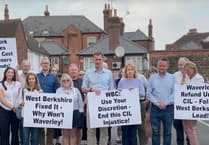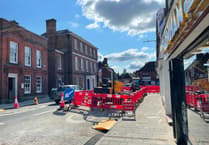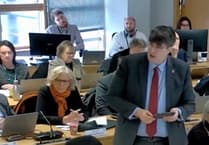WAVERLEY Borough Council has been accused of deliberately circumventing its own planning policies after councillors granted Farnham Town FC’s new changing rooms at the Memorial Ground, built last year without planning permission, a three-year stay of execution.
The council, which is working alongside tenants Farnham Town FC to improve the facilities at the sports ground, was forced into an embarrassing admission last year after a member of the public, Rowledge-based architect Mark Westcott, pointed out the new changing rooms lacked the required planning consent.
A planning application was subsequently submitted earlier this year for a total of three temporary buildings, and on Wednesday, March 29, Waverley’s western planning committee granted consent for the buildings to remain in situ until 2020.
The decision was far from unanimous, however, and came only after Mr Westcott and several members of the council’s Farnham Residents opposition called on the committee to refuse, or at least defer the decision until a later date - citing policy FNP2 of the emerging neighbourhood plan, which resists inappropriate development in the Farnham Town Centre Conservation Area.
The strongest objections were made by Farnham Residents’ councillor John Fraser, who accused council officers of more nefarious motives, referring to Waverley’s ambition - as expressed in February 2016 - to relocate Farnham Town FC to the former Weydon Lane landfill site and in-turn redevelop the Memorial Ground for housing.
Addressing fellow members of the committee on March 29, Mr Fraser said: “It is a sadness to reflect that one of the first real challenges to the spirit, if not to the letter of the new Farnham Neighbourhood Plan should come from Waverley borough planners on behalf of the Farnham Town FC. But then only because this council has ambitions for the ground.
“These dreadful, utilitarian temporary structures would have been greeted with horror by this committee had they been properly presented before construction. So Waverley’s ‘Baldrick’ devised a cunning plan. Assemble the changing rooms first and then seek permission afterwards, pitting the Neighbourhood Plan and the interests of residents against the future of their Farnham Town FC.
“While I sympathise with the football club and the difficulties they may face, I favour the objecting residents, the Farnham Society, the town council, the Farnham Design Statement and most of all the endeavours of the Neighbourhood Plan to preserve the environment from awful buildings such as this.”
Responding, a succession of Conservative councillors acknowledged that the new buildings are “utilitarian” in design and even expressed regret at the council’s handling of the improvements to the ground. However, they agreed almost universally that the changing rooms were vital to the future of the club.
Tory councillor Pat Frost said: “This is a no-brainer. Farnham Town FC is loved in the town and it’s been there a long time, but they can’t play without facilities. I regret that officers didn’t make it clear to the football club what the issues were with planning, but if so we wouldn’t be in the situation we’re in now.
“The facilities are there, let’s give them the planning permission on a temporary basis. I don’t like the grey [colour of the buildings], but this is only for three years and we’re not here to debate what the club is planning in three years’ time.”
This point was reinforced by Farnham Town FC committee member Mick Morgan, who told the committee that should the application be rejected, the club would be unable to meet strict Football Association ground-grading criteria and subsequently “the adult section of the club will be unable to play football at any level”.
This stems from the fact that the club, which has historically utilised the ground floor of the adjoining Memorial Hall in West Street as changing facilities, has been displaced permanently by Waverley’s ongoing refurbishment works at the hall.
Concerns were also raised by independent councillor Andy MacLeod that the application breaches the covenant set in place by Farnham United Breweries when gifting the land to the people of Farnham in 1947, “amongst which was that nothing should be built on the sports ground and the sports ground should only be given to an organisation for a maximum of 24 hours”.
However, council officers said this was not a determining issue for the planning committee, and expressing his support for the football club, Mr MacLeod added: “There’s no way I can vote against this and put the football club in the situation where they don’t have changing rooms.”
Responding to questions about the temporary nature of the buildings, council officers also said the club is in the process of exploring the viability of other sites, and that three years was an “appropriate time to allow that to happen”.



-Continental-Ordained-Ministers-Conference-2024.png?width=209&height=140&crop=209:145,smart&quality=75)
Comments
This article has no comments yet. Be the first to leave a comment.